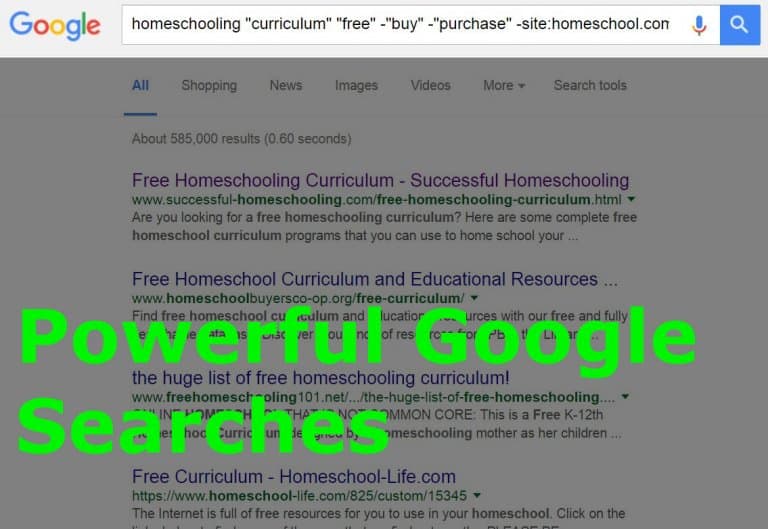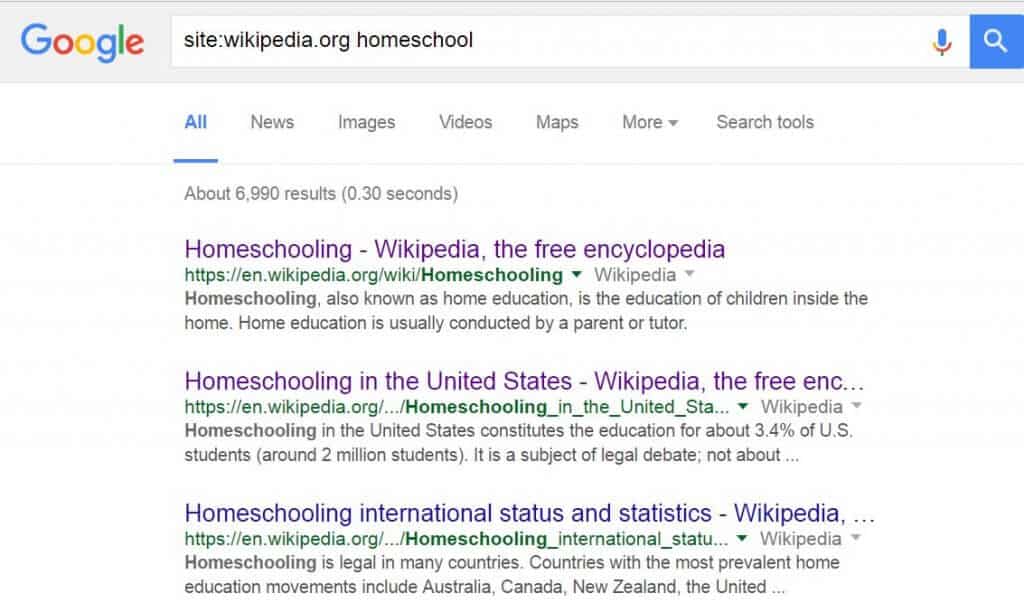How To Find All The Homeschooling Resources You'll Ever Need With Google

This post is about to unlock a lot of doors for some homeschoolers. No matter how long you've been homeschooling, you know that there are millions of resources out there. If you're interested in following along with another homeschool mom's life, there are thousands of homeschool mom blogs. If you're trying to get started, there are hundreds of resource websites out there. Then, there are the legal websites, the organizational websites, and the state/government websites. Oh, and don't forget about the numerous forums. Your co-op might even have a website.
If you're looking for parenting advice to go along with homeschooling, that opens up additional doors. Parenting is a broad category that lots of other sites cover.
All of these websites have good information! You can't possibly scan through them all! You would never get anything done. If there are homeschool blogs you love, absolutely bookmark them and check back regularly. BUT, when it comes to 'researching' and looking for specific help online, sorting through all of these sites hoping to find a specific topic can be a huge pain. Many of the big websites don't have very good search functions on their sites. So, when you search something it might not show up even if it exists.
Here are my solutions to navigating the internet of homeschooling.
Make full use of Google's potential
Most people use Google without understanding its full potential. Have you ever heard of Google search operators? Probably not. Most people arrive at Google, see a search bar, type in a keyword, and then scroll through results. I know some people who switch to Yahoo or Bing if the first page of Google doesn't contain the information they want.
No. No. No.
Google is so much more powerful than that. Google's initial interface is deceptively simple!
Using Google search operators for homeschooling keywords
So, what are search operators? You can read the full article on Google's support site if you wish, but I'll cover the important topics. Search operators allow you to make your Google query far more specific.
Solving the problem of poor internal search results on big websites
Lots of times the internal searches on BIG websites isn't very good. It is hard to build a powerful search engine. There is a reason why Google doesn't have 100s of competitors. Instead of using a pretty lame search bar within a website, you can use this trick.
site:wikipedia.org
This will show you every single page that Google has indexed for Wikipedia. Now, you can add a keyword after Wikipedia and Google will show you results only from Wikipedia.org that contain the keyword. For instance:
site:wikipedia.org homeschool
Now, every single result will be from Wikipedia. This is useful even when a site has a pretty good search bar. With Google, you can see which pages are generally most important. And you can combine the search with additional search operators.

Require that your keyword or "phrase" exists on the website
Let's continue with the Wikipedia example. Now, imagine that you wanted to find a page that talked about homeschool education. You might search for:
site:wikipedia.org homeschool education for all
It looks like this brings up some relevant results! BUT, what if you really meant for the phrase "education for all" to be exactly in that order? If you change the search to this:
site:wikipedia.org famous homeschool "education for all"
You will notice that Charlotte Mason jumps to the very top! It wasn't on the first page earlier. That's because "quotes" requires that words exist on a page in that exact order.
Note: The order of words matters when you use quotes. So, if you're searching for a phrase, it must be in the correct order or you will only find results for whatever order you used the words.
Remove search results you do not want to see
But, what if you didn't want Charlotte Mason to show up? In fact, you are sick of seeing Charlotte's name. (We're just using this as an example). You can completely exclude all pages that mention her name by doing this:
site:wikipedia.org famous homeschool "education for all" -"charlotte mason"
The - will remove all results that use the keyword. If you just want to remove a single keyword you can just search for
site:wikipedia.org famous homeschool "education for all" -Charlotte
This is especially helpful for keywords that have many meanings. For instance, if I want to search for something about Apples and Google keeps showing me results for Apple computers, I would use the - operator. I really want to be searching for the kind that you eat. So, I'll pick a keyword that is very common to Apple computers and include that in my search with the - operator. To find edible apples I might search this:
the best apple -computer
Try the difference yourself. You'll notice you still get some technology related results but there are far fewer. Just add more -keywords to remove even more stuff you don't want.
I'm sick of seeing so many results from [insert website name]
The exclusion operator works for removing an entire website domain name as well. To remove all Wikipedia results from a search just do this:
homeschool -site:wikipedia.org
Now, we won't see any results coming from Wikipedia.org. Obviously, substitute other sites in or substitute multiple sites (-site:one.com -site:two.com etc)
I only trust sources from other homeschool bloggers like me
Well, there is an easy fix for that as well. If you don't want to use any corporate websites, curriculum websites, etc you can use several tricks to limit the search results to just bloggers. You can find Blogger bloggers by adding
site:.blogspot.com
to your searches (make note of the "."). BUT, not all bloggers use Blogspot. And, sometimes they buy their own domains. You can then start looking for little keywords that ALL Blogspot websites use. For instance,
"powered by blogger" homeschool
There are other common phrases (also called strings) that bloggers use. WordPress sites often have "powered by WordPress" in their footer. Lots of "authentic" homeschool moms have sidebars where they introduce themselves. You can use keywords from those.
One great way to find blogs is to use inurl: like so:
inurl:blog homeschool
This forces Google to only display sites in the results that have "blog" in the URL. There are many other specific things that most blogs have in the URL. Sometimes they have "post," or a date, etc.
"If only there were more sites like this!"
Have you ever thought that before? Gee, I wish there were more websites that talked about ___. Well, Google has a search tool for that! It's called "related." You use it like this:
related:homeschoolbase.com
And it will spit out websites that are similar! This works for services and content based sites.
How is this useful to homeschooling?
Let's say that I want to find printables. But, maybe the only printables that I can find have Bible verses on them. And, I'm going to be using these in my co-op where we have a few secular families. I could search for
homeschool printables "secular"
to force Google to only show me pages that were about printables that ALSO contained "secular." Or, I might try excluding some Christian keywords. Because maybe the secular results don't actually mention "secular" on the page, and maybe the Christian sites usually have the keyword "Christian" or "Christ" or "Bible" somewhere.
Find recent material by searching by date

There are some really old homeschooling websites that show up really high in Google results. These sites might be outdated, but Google trusts them because they are old. Or, maybe they have more keywords about what you're searching for, but you've already seen those pages. Personally, I like to see recent results so that I can comment. So, the next thing we can do is limit our search to only recent results. For example:
homeschool printables
This turns up a lot of websites and old sites. Maybe I'm just looking for the newest posts? Click on "Search Tools" after you've searched for the keyword. Then, click on "Any Time" and select the past 24 hours, past week, past month, or past year.
This is especially helpful if a curriculum has been updated in the past year and you only want to see results for the new version. Or, maybe you want to be the first to comment on a homeschool blog that made a new printable.
Be the first to know!
Continuing the theme of wanting to be one of the first people to know something, Google has another really handy tool. Google Alerts. You can schedule Google to send you results every time a post or page or news story is published that contains a keyword. So, if you are really interested in a specific niche of homeschool that doesn't get mentioned too often I would suggest you create a Google Alert.
Lots of people like to add alerts for their personal name! Beware, you'll get a lot of emails if your name is Mary Smith.
How to find free homeschool curriculum
Hopefully it is pretty easy to see how these search tools can be very, very useful. But, just as a final example we'll look at finding free homeschool curriculum online.
homeschooling "curriculum" "free" -"buy" -"purchase" -site:homeschool.com -site:secularhomeschool.com -site:time4learning.com
I limited the above search to only the past week.
What did this search do? It returned websites that were talking about free curriculum. I removed all pages that mentioned the words buy and purchase, because this often means there is a catch to the 'free.' Then I removed 3 big websites from the search results that I've already looked through.
What you're left with is a list of websites that are actively posting about free homeschooling curriculum.
Conclusion
One last point! Every operator you've seen used above can be combined together to make an extremely complex and specific search query. Don't be afraid to experiment! Additionally, this is valuable knowledge for research in general -- not just homeschooling research.
The takeaway is that you can use Google's search function to really power-up your searches so that you find the homeschool resources, curriculum, bloggers, news, and articles you need as fast as possible and as accurately as possible. Anything that has been published online can be found!







Wow! Very in-depth and extensive! I'm going to have to completely re-think everything I know about Google research.
Don't forget to add "do a barrel roll" search!!!! Its the best!
Oh my gosh, that was too funny! Who knew!!!